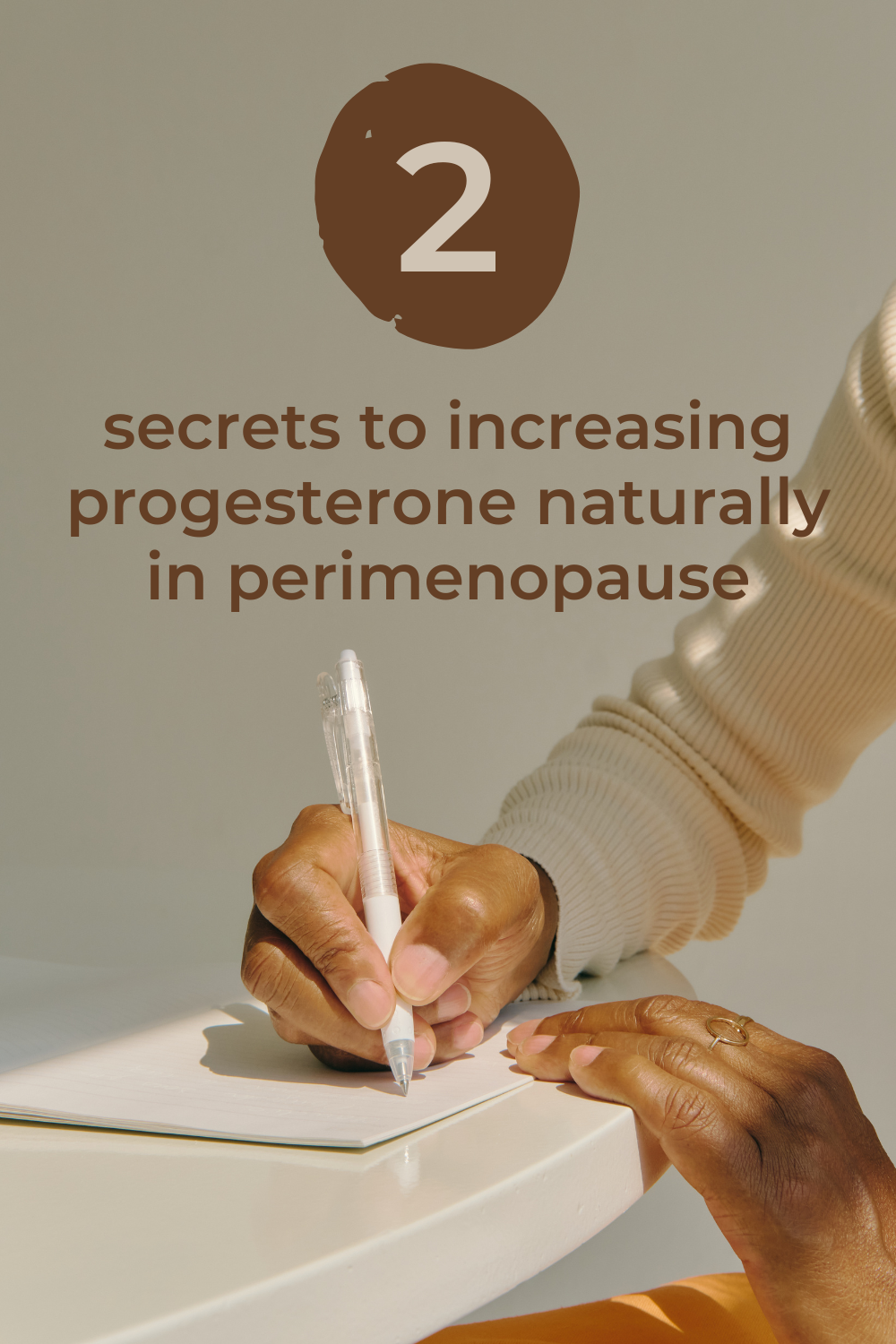If you are 35-45 and have started feeling out of sorts and think it’s your hormones, here’s what will happen… you will go to the doctor who will order some blood tests and they will come back ‘normal’. You will be told that either everything is fine or offered the pill or even anti-depressants. How do I know this? Because this is what women are telling me every single week and this was my exact experience too! If you are reading this and finding it relatable, read on because I am going to share with you 2 Secrets to increasing Progesterone levels naturally.
Perimenopause and Progesterone
From around our mid-30s ovarian function begins to slow and we start moving towards perimenopause. Initially, our calming hormone progesterone falls off a cliff and as we move through perimenopause oestrogen begins fluctuating wildly.
In any given month, we can experience symptoms of low progesterone as well as oestrogen dominance and low oestrogen.
Hormones and Modern Life
Our modern way of living exacerbates all of this. As ovarian function slows, the adrenal glands start making progesterone and oestrogen. However, our adrenal glands are responsible for making our stress hormones and for most women by their mid-30s, their adrenal glands are exhausted.
We live far too busy lives – we may be raising a family, caring for elderly or sick relatives, working, whilst being a good friend, keeping our houses clean, going to the gym, rushing here there and everywhere, being all things to all people. All whilst never asking for help!
At the same time, we have social media, 24-hour news cycles, never-ending emails, traffic, pollution, toxins, and ultra-processed foods all of which add layers of extra stress.
Stress and Perimenopause
When the brain feels constantly stressed, it assumes there is a threat to life. When there is a threat to life, making appropriate amounts of oestrogen and progesterone is not a priority. The brain just needs to keep up with the stress hormones to give you the energy to ‘fight or flight’ from that stress.
And so, all of your hormonal symptoms get worse, the weight gain keeps coming and you get no answers from your doctors because they are not looking at you as a whole person and they are not testing for the right things.
2 Secrets to Increasing Progesterone Levels in Perimenopause
1. Focus on the whole
Hormonal symptoms don’t just appear out of the blue. There have been years of not tending to hormonal needs, through this fast-paced life that we live which is not conducive to women’s hormonal health, not necessarily always eating the right foods or getting the nutrients required, and the big one, not having not dealt with emotions. Time and time again, I see women with emotional upsets, trauma, grief etc in their history that has been suppressed – women who have had to just get on with things.
One thing I do with all my clients is a hormonal timeline – looking at everything from their birth to hormonal interventions, pregnancies and periods. Any emotional upsets, shocks, grief, operations, medications, and big life changes are added to that timeline too. Doing this gives me clues as to what needs addressing because we can look at that timeline and see what came before our hormonal discomfort.
When addressing the whole yes, we want to focus on good nutrition, stress management, and doing the right kind of exercise, but we also need to be digging deeper and looking at what in your timeline, has caused ‘dis-ease’ in the hormonal sphere.
2. Blood Sugar Balance
As our hormones begin fluctuating, specifically oestrogen, we become less receptive to the message of insulin and we end up on the blood sugar roller coaster. And in this state we gain weight, we have low mood, low energy and sleep problems. And because all hormones are connected if you are on the blood sugar roller coaster, you will have excess cortisol, which will affect progesterone levels.
Eating to balance your blood sugar levels involves removing sugar and refined carbohydrates and instead focusing on high protein, lots of fibrous vegetables and healthy fats. This is particularly important at breakfast. A high-protein breakfast will set you up for better blood sugar balance throughout the rest of the day.
If you want help in this regard, grab my free guide to Thriving in your 40s & beyond, where I go through blood sugar balance and 2 other hacks to optimise your systems so you can reclaim your mood, energy and weight and get back to feeling your best.
Hormone Balance Journey
Your low progesterone state and hormonal symptoms didn’t appear overnight, and they won’t get better overnight either. Be kind and compassionate to yourself as healing takes time. And remember, symptoms are not the enemy they are messages from your body letting you know something is out of balance!
P.S This is the final blog in a series on increasing progesterone naturally. You can find the other blogs here.


